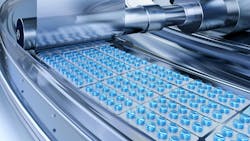Biogen invests $2 billion to expand pharmaceutical manufacturing facilities in North Carolina
Biogen has announced plans to invest an additional $2 billion to expand its pharmaceutical manufacturing facilities in Research Triangle Park, North Carolina. The company, which develops and manufactures innovative treatments for neurological and neurodegenerative diseases, is expanding its footprint across two campuses and supporting ongoing clinical and commercial production.
The investment will fund the continued growth of Biogen’s antisense oligonucleotide capabilities, the addition of multi-platform clinical and commercial fill-finish infrastructure, and the modernization of manufacturing technologies through automation and artificial intelligence. The expansion will support the company’s late-stage clinical pipeline and aims to improve patient supply resilience.
Biogen currently employs more than 1,500 manufacturing and technical professionals and over 400 skilled contractors across its Wake County and Durham County campuses. More than 90% of the company’s innovator commercial medicines undergo manufacturing and quality control testing in the United States.
What people are saying
In a recent quote, Nicole Murphy, Head of Pharmaceutical Operations and Technology, Biogen, said, “We are proud of our longstanding commitment to manufacturing innovation, investment, and collaboration with the Research Triangle Park community. Our manufacturing footprint in the United States has played a critical role in Biogen’s history and success, and in advancing the treatments that are making an impact for patients, families, and communities here in the U.S. and around the world. With this investment, we will modernize and expand our manufacturing capability to enable our pipeline and provide resilient patient supply, while continuing to support the skilled and dedicated community of life sciences talent in North Carolina.”
Manufacturers investing in the Carolinas
Sanner opens medical and pharmaceutical packaging manufacturing facility in North Carolina
The Greensboro facility features cleanroom space, automated production lines, and full laboratory capabilities for testing and metrology.
Rolls-Royce invests $75M to expand engine manufacturing facility in South Carolina
The expansion will increase the facility’s machining capabilities and add 60 new jobs to the company’s U.S. operations.
Nucor invests $20 million to open rebar fabrication facility in North Carolina
Nucor will receive a $50,000 performance-based grant from the One North Carolina Fund.
Investing in American manufacturing in 2025
This map shows where manufacturers are choosing to invest their resources, whether they are building new production facilities or expanding existing plants.
About the Author

Thomas Wilk
editor in chief
Thomas Wilk joined Plant Services as editor in chief in 2014. Previously, Wilk was content strategist / mobile media manager at Panduit. Prior to Panduit, Tom was lead editor for Battelle Memorial Institute's Environmental Restoration team, and taught business and technical writing at Ohio State University for eight years. Tom holds a BA from the University of Illinois and an MA from Ohio State University
